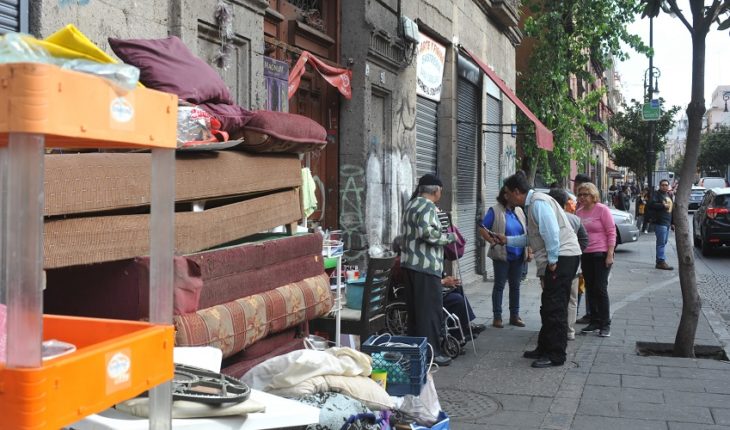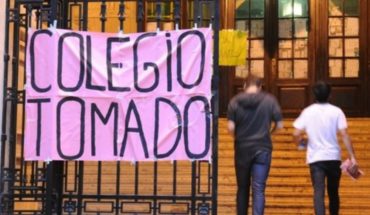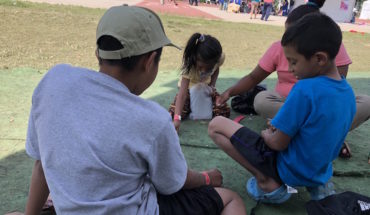Alleged apartment owners conducting real estate mobbing, mock trials, forgery of documents, landlords forcing tenants out overnight under the argument that the building will be remodeled to become office spaces or rent them on the Airbnb tourist platform, have helped hundreds of people move from their homes in Mexico City.
The scenario has been repeated in at least 10 cases documented by Animal Político this year, through citizen complaints made to the press or presented to this medium, mainly in buildings located in the Historic Center, and in colonies such as Juárez , Doctors, the Worker, Rome-Count, Santa Maria la Ribera and in San Rafael.
On August 20, Carlos Acuña, a tenant of the Trevi building, located at Cristóbal Colón 1, next to the Alameda, in the center of the CDMX, was evicted even though he had a current contract, two protections pending and a complaint in the Capit Human Rights Commission (CDHDF) due to irregularities detected following some eviction warnings.
According to Acuña, the building where he lived for more than nine years was purchased in early 2018 by Banca Mifel to integrate it into a commercial development that will include a boutique hotel and coworking offices. Mifel acts on behalf of the real estate company that has as its trade name Public Trabajo.
The property is in dispute between the buyers and some neighbours who filed a legal remedy because they were not respected the right of preference (known as the right to the list), as provided for in the law, which would have given them the priority of buying the space who for years have leased.
Animal Político sought out Banca Mifel to know its version, but until the close of this edition there was no response, while one of the executives of the company Public Trabajo, dedicated to developing coworking spaces, said that they have no spokespeople or area to attend the request.
Tenants so far have nine open trials against them. They are mainly accused of not paying the rent, although all payments have been made. “The one who evicted me was Banca Mifel with Public Coworking and companies that do not face. Paid rents, current contract, protections to stop gas lawsuits, this was an attack on me, for making the issue more visibility,” Accuses Acuña.
Of the tenants who inhabited more than 30 departments of the property, two wineries and five commercial premises, 13 decided to take legal action, 11 through a collective complaint and two in individual proceedings against the previous owners of the building.
The property of the middle of the last century was built as a social housing and in the lower part is the historic Café Trevi, with more than 60 years of history and that has passed through the hands of three generations. What happens to him is still uncertain.
Irregularities detect
María Silvia Emanuelli, coordinator of the Office for Latin America of the International Habitat Coalition, points out that in recent years several irregularities have been detected in evictions in the country’s capital, where real estate speculation, sometimes mixed with irregularities in the legal possession of tenants is exploited by third parties.
“We are facing mock trials and corruption that can start from notaries who lend themselves to falsifying documents to allegedly check the property to tenants who want to evict, in front of judges and actuaries who do not report, or who may even apocryphal, and coluded Public Registry officials,” he tells Political Animal.
The downtown area is increasingly expensive and unattainable to buy or rent due to the so-called gentrification, a process by which an area of the city, which had a certain population with certain characteristics, changes by a population of higher incomes, causing an increase in land prices, housing, rent and services, explains Emanuelli.
However, when real estate and commercial development is left to the free market, without regulation, there is a social impact: it generates displaced people.
The evictions in Mexico City not only leave people homeless, they also break the community fabric, their social and neighborhood support network, it excludes them to more remote areas. “It’s something that no one is looking at, what happens to them, where they’re going,” she says, she says, and who advises several people who have tried to evict.
Data obtained by the Neighborhood Platform and Observatory of the Historic Center, through a request for access to information, show that the number of evictions has increased.
In 2014, the public force participated in 3,140 evictions in Mexico City; during 2015 there were 3 thousand; in 2016, the number was 3,000; 3,141 evictions were made in 2017.
In 2018 the number grew to 3,729 evictions using public force. Until February of this year, the city’s police force had already participated in 403 evictions, according to the Directorate-General for Legal Affairs of the Ministry of Citizen Security.
These data are from evictions who had a permit to make use of public force. There are no official figures for those that were made without an authority intervening.
In several cases, Emanuelli says, due process failures have been detected and affected persons are not notified of eviction under the law.
You may be interested: ‘We have nowhere to go, where to stay,’ testimonies of the eviction in the Juarez colony say
“They want to make my life impossible”
Rufina Galindo suffers from real estate mobbing (harassment to force tenants to leave their homes through aggression and intimidation). He lives in an apartment located in a building in the Historic Center, at Calle Zapata 68. Of the 24 families that lived there, only she and her daughter who also rented, the rest of her neighbors were evicted, several with violence.
In 2004, the owner of the property to whom she paid rent died, 14 years later appeared an alleged heir and owner of the building who has not been able to legally verify that the building is his, but evicted the tenants, one by one.
After the evictions, in February this year the supposed owner of the building took more than 20 people to inhabit the apartments, most, says Rufina, aggressive young people who control the entrance and exit.
Rufina, 64, suffers from diabetes, one day she felt very unwell and asked for support from one of the neighbors on the block, but the new inhabitants forbade her entry. She is a seamstress and has lost clients because they are afraid to go to the property; They’ve stolen his gas tanks and even beat his grandson. The woman has been going through this harassment for almost half a year.
The last eviction occurred in November 2018. The alleged landlord filed a rent late lawsuit against the tenants, however, used the names of deceased persons who previously rented, who no longer even live in the building or fake names.
Rufina was tried to evict her on the grounds that she did not pay the rent, but the lawsuit was not against her, came to the name of Felipe López Fernández, her uncle, the former tenant, but the second surname was wrong, the right thing was Hernandez.
When she argued this mistake, she was accused of invading the department. Six families living in the property were either evicted, Rufina has not been able to get out because she is covered and currently in negotiations with the National Housing Institute (Invi) who also reviews the legal situation of the property.
“They want to make my life impossible for me to get out,” he says. She resists because she defends her right to housing, but everything is still in legal limbo.
Find out: Members rectify the law on evictions in CDMX; previous drafting benefited invaders, they say
That’s how they fool people
According to the Capital Prosecutor’s Office, there are four modalities that have been detected to seize land and housing: groups violently break into the home with weapons and threaten the owners and force them to sign notary documents in which they they give up the property.
People pretend to be lawyers for the Institute of Administrative Verification and the Local Board of Conciliation and Arbitration and display false documents with eviction orders; promise to enroll in housing or government reconstruction programs and seize houses, apartments or land
Another way is to present themselves as new owners or legal guardians, they claim to have permits to remodel and rent the spaces to companies.
Most of those affected are elderly adults without families and people with limited resources with little chance of facing legal judgment.
In May, the Capital Prosecutor’s Office reported that, with the support of the Financial Intelligence Unit of the Ministry of Finance, notaries, lawyers, leaders and real estate involved in these crimes are being investigated.
The right to housing, threatened
For Carlos Escoffié, lawyer who collaborates with different human rights organizations, gentrification, corruption and real estate mafias are threatening the right to housing of the inhabitants of the capital.
The right to housing, Escoffié explains, is not limited to the right to be able to apply to Credits of Infonavit, Fovissste or banking and have a home of its own. “More than a real estate issue is a human rights issue.”
The right to housing also has to do with the guarantees that people who live in houses or apartments that are not your property, who rent or are borrowed. It is to have guarantees of permanence, without being arbitrarily expelled. It has to do with the peace of mind that sand i can lead a life project where you’re settling in. It is the right to legal guarantees of public policies and judgments that avoid the street situation, the litigator details.
According to Escoffié, real estate speculation is taking on the role of the state in urban planning. It is they who decide where, how and for whom to build or rent. They dictate the rules of the development of the city.
In Spain, for example, measures have been taken in favour of the right to housing such as limiting the number of apartments in a building that can be used by rental platforms for tourism, set caps on rental prices and development plans determine mixed areas, including residential, commercial and social interest areas.
Amparo trials against article-to-item on evictions
Just in June, the Federation Judiciary admitted five protections for changes to section 60 of the Human Rights Act dealing with evictions in Mexico City.
In May, controversy arose over section 60 of the local Human Rights Act, which stated that forced evictions or launches could be carried out only in exceptional cases; it also ordered adequate rehousing of evicted persons.
The old wording of the article provided that the authorities had to ensure the adequate rehousing of people without evicted resources, within a radius of no more than 15 kilometres taking as its centre the place of origin.
However, members of the Mexico City Congress reformed the legislation to make evictions based on injunctions, and included that individuals will be able to apply for housing programs.
For neighborhood groups, these amendments made by the Capital Congress constitute a regressive measure to the Constitution and various international treaties on the human right to housing.
The lawsuits for protection were filed by women, indigenous people, people with disabilities and older adults who were evicred.
What we do in Animal Político requires professional journalists, teamwork, dialogue with readers and something very important: independence. You can help us keep going. Be part of the team.
Subscribe to Animal Politician, receive benefits and support free journalism.#YoSoyAnimal
translated from Spanish: Irregularities and harassment behind evictions of families in CDMX
August 22, 2019 |





